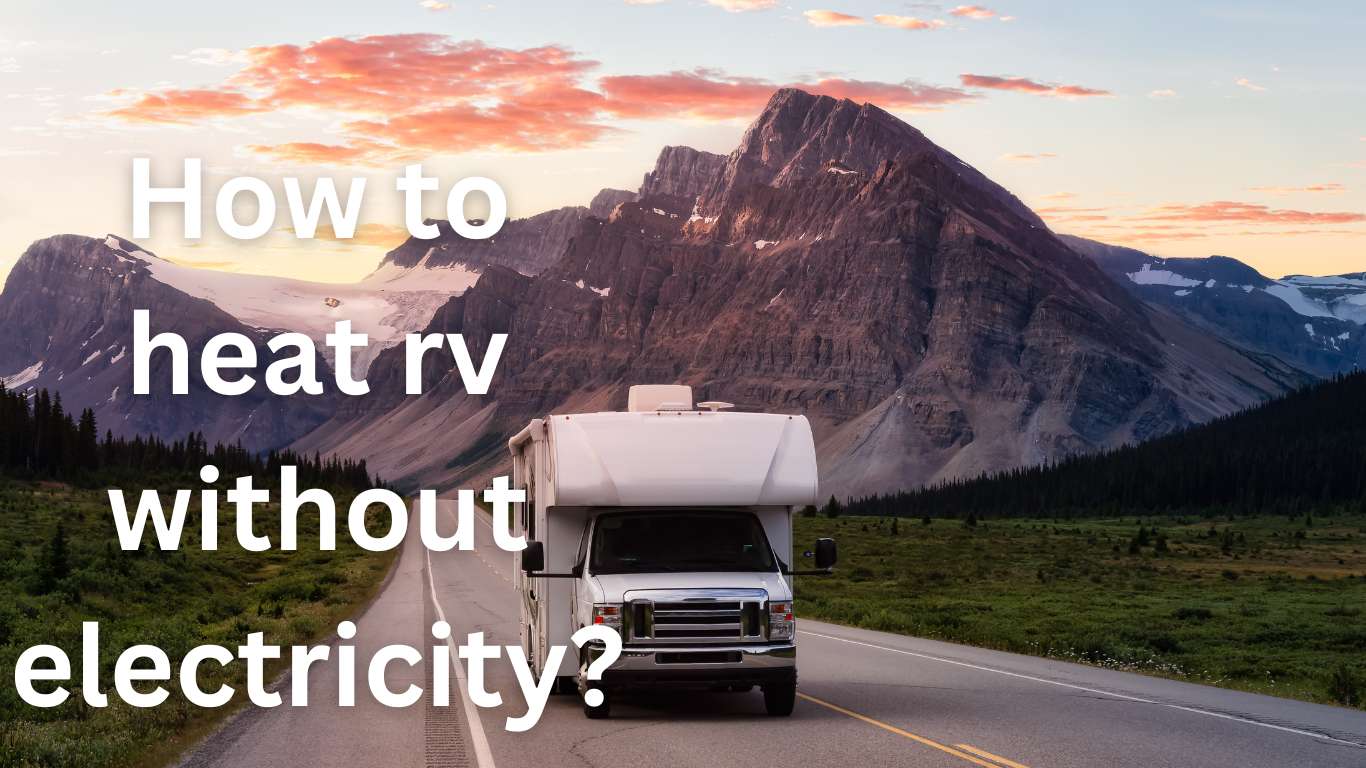Keeping your RV warm without electricity is essential during cold trips or when off-grid. Fortunately, there are several effective ways to heat your RV without relying on power. Let’s explore the best methods below. Heating your RV without electricity is entirely possible with the right approach. Whether you opt for a propane heater, wood stove, or improved insulation, these solutions will keep you warm and comfortable on your adventures. Always prioritize safety, especially when using fuel-based heating methods.
Types of Power in an RV
Understanding the different types of power in an RV is essential for a smooth and enjoyable journey. RVs rely on multiple power sources to operate appliances, lighting, and heating systems. Here are the main types of power used in an RV:
1. Shore Power (AC Power)
Shore power refers to plugging your RV into an external power source at campgrounds or RV parks.
Features of Shore Power
- Provides 120V AC power for running large appliances like air conditioners and microwaves.
- Requires a compatible RV power cord (30-amp or 50-amp).
- Reliable for long-term stays with access to electricity.
2. Generator Power
A generator produces electricity to power your RV when shore power isn’t available.
Why Generators Are Useful
- Provides on-demand power anywhere, ideal for boondocking or dry camping.
- Capable of running large appliances and charging batteries.
- Available in built-in (onboard) or portable models.
Fuel Sources for Generators
- Gasoline
- Diesel
- Propane
3. Battery Power (DC Power)
RVs use deep-cycle batteries to supply 12V DC power to essential systems.
Uses of RV Batteries
- Powering lights, water pumps, and fans.
- Running small appliances like USB chargers.
- Serving as backup power for off-grid travel.
Battery Types
- Lead-Acid Batteries: Affordable but require maintenance.
- Lithium-Ion Batteries: Lightweight, long-lasting, and more efficient.
4. Solar Power
Solar power is a sustainable and popular energy option for RVs.
How Solar Power Works
- Solar panels collect sunlight and convert it into electricity.
- Energy is stored in batteries for later use.
Benefits of Solar Power
- Environmentally friendly and silent operation.
- Ideal for off-grid camping and long-term boondocking.
- Reduces reliance on fuel-based generators.
5. Propane Power
Propane is commonly used for heating and cooking in RVs.
Common Propane-Powered Systems
- RV furnaces for heating.
- Stoves and ovens for cooking.
- Refrigerators with dual power options (propane and electricity).
Advantages of Propane
- Efficient and cost-effective fuel.
- Works without electricity, making it perfect for off-grid use.
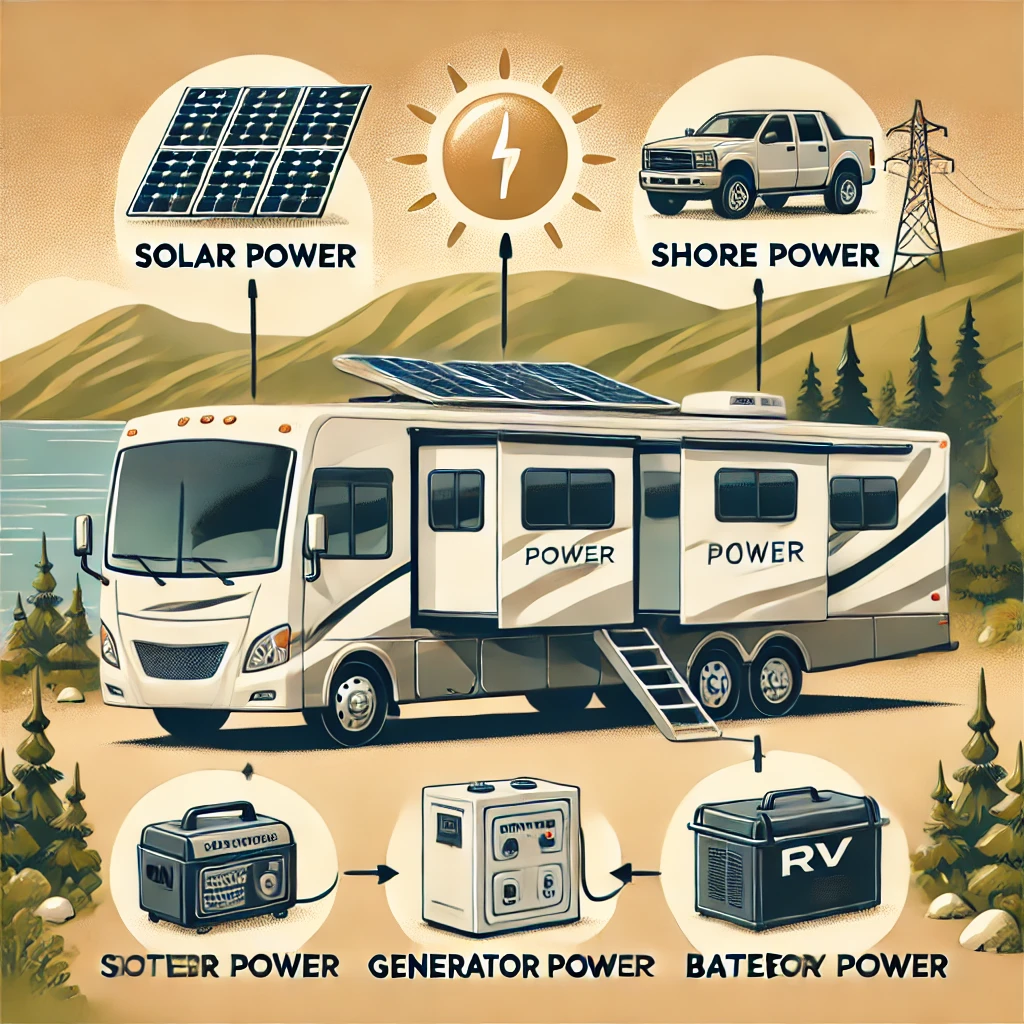
Methods to Heat an RV Without Electricity
Heating your RV without electricity is essential for off-grid camping, boondocking, or emergencies. Fortunately, there are several efficient and reliable ways to keep your RV warm.
1. Propane Heaters
Propane heaters are one of the most popular and effective options for heating an RV without electricity.
Benefits of Propane Heaters
- Highly efficient: Quickly heats the RV interior.
- Cost-effective: Propane is affordable and readily available.
- Portable: Easy to move around your RV.
Safety Tips
- Ensure proper ventilation to prevent carbon monoxide buildup.
- Use a carbon monoxide detector for added safety.
- Never leave a propane heater unattended.
2. Catalytic Heaters
Catalytic heaters are a safe and flameless alternative to traditional propane heaters.
Why Catalytic Heaters Are Ideal
- No open flame: Reduces fire risks.
- Fuel-efficient: Uses minimal propane for maximum heat.
- Quiet operation: Perfect for nighttime use.
3. Wood-Burning Stove
Installing a compact wood-burning stove can provide steady, long-lasting heat without electricity.
Advantages of a Wood-Burning Stove
- Fuel availability: Use natural firewood.
- Sustained warmth: Provides continuous heat for hours.
- Aesthetic appeal: Adds a cozy, rustic feel to your RV.
Installation Tips
- Use a heat-resistant surface for mounting.
- Install a chimney for proper ventilation.
4. Insulate Your RV
Proper insulation helps trap heat and keeps your RV warm longer.
Insulation Methods
- Seal windows and doors: Use weatherstripping to eliminate drafts.
- Thermal curtains: Prevent heat loss through windows.
- Rugs and foam mats: Insulate floors to retain warmth.
5. Use Portable Butane Heaters
Butane heaters are compact and easy to use, making them ideal for small RV spaces.
Key Benefits
- Portable and lightweight: Easy to store and move.
- Quick heating: Efficiently warms up small areas.
Safety Precautions
- Ventilate the RV while using the heater.
- Never use butane heaters overnight.
6. Layer Up and Use Thermal Accessories
Sometimes, simple solutions work best for staying warm.
Tips for Staying Cozy
- Wear thermal clothing and socks.
- Use insulated sleeping bags or wool blankets.
- Heat water bottles and place them in your bed before sleeping.
7. Park Strategically
Your parking location can naturally help keep your RV warmer.
Strategic Parking Tips
- Park facing the sun to capture natural heat during the day.
- Find wind-sheltered areas, like near trees or hills.
- Avoid low-lying areas where cold air settles.
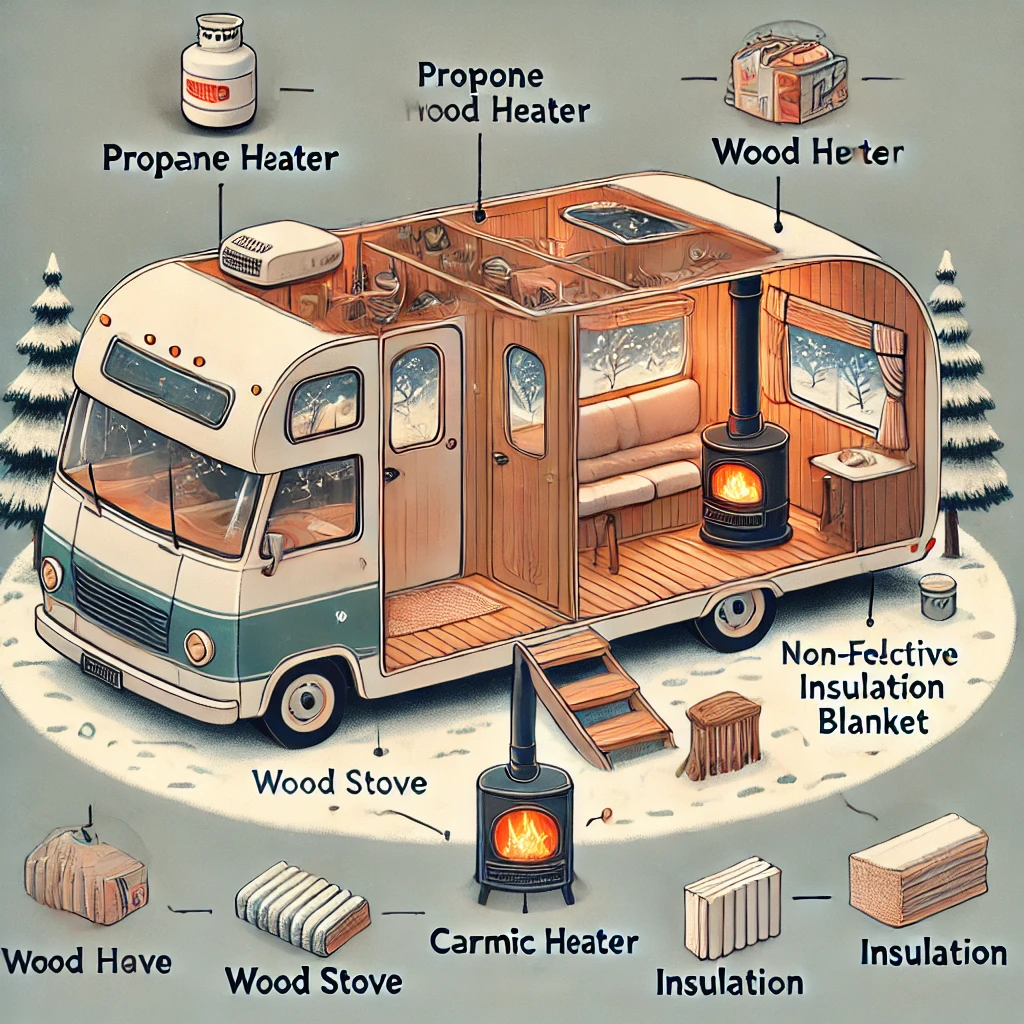
What is the Most Efficient Way to Heat an RV?
The most efficient way to heat an RV depends on your energy source, travel style, and location. However, propane furnaces, infrared heaters, and heat pumps are among the most popular and effective options. Let’s explore the best methods to efficiently heat your RV.
1. Propane Furnace – Best for Overall Efficiency
A propane furnace is the most common and efficient heating method in RVs.
Why Propane Furnaces Are Efficient
- Quick Heating: Propane furnaces provide powerful, consistent heat.
- Built-In Systems: Most RVs already come with propane furnace systems.
- Energy Independent: Works well off-grid without shore power.
Efficiency Tips
- Use a thermostat to control propane usage.
- Regularly clean vents and check for leaks to optimize performance.
2. Catalytic Heaters – Best for Off-Grid Heating
Catalytic heaters are flameless, propane-based heaters that efficiently heat small spaces.
Advantages of Catalytic Heaters
- Fuel Efficient: Uses minimal propane for maximum heat.
- No Electricity Needed: Ideal for boondocking or dry camping.
- Safe and Quiet: No flame means reduced fire risk and silent operation.
3. Electric Space Heaters – Best for Hookups
When connected to shore power, electric space heaters provide cost-effective heating.
Why Electric Heaters Work Well
- Energy Efficient: Converts electricity directly into heat.
- Affordable: Many models are inexpensive and compact.
- Easy to Use: Requires minimal maintenance.
Considerations
- Electric heaters require shore power or a generator.
- Use models with tip-over protection and auto shut-off for safety.
4. Heat Pumps – Best for Mild Climates
Heat pumps are part of RV air conditioning systems that can also produce heat.
Benefits of Heat Pumps
- Energy Saving: Uses less energy than propane or electric furnaces.
- Dual Purpose: Provides heating in winter and cooling in summer.
- Clean Heating: Produces no emissions or fumes.
Limitations
- Heat pumps are less effective in extremely cold temperatures (below 40°F).
5. Wood-Burning Stove – Best for Long-Term Off-Grid Use
For RVers spending extended time off-grid, a small wood-burning stove is a reliable and efficient heat source.
Why Wood Stoves Stand Out
- No Fuel Costs: Uses natural wood.
- Continuous Heat: Provides steady, long-lasting warmth.
- Environmentally Friendly: Reduces dependence on propane or electricity.
Efficiency Tips to Maximize Heat in an RV
To improve any heating method’s efficiency:
- Insulate your RV with thermal curtains, weatherstripping, and rugs.
- Seal gaps in doors and windows to prevent heat loss.
- Park in sunny areas and avoid wind exposure.
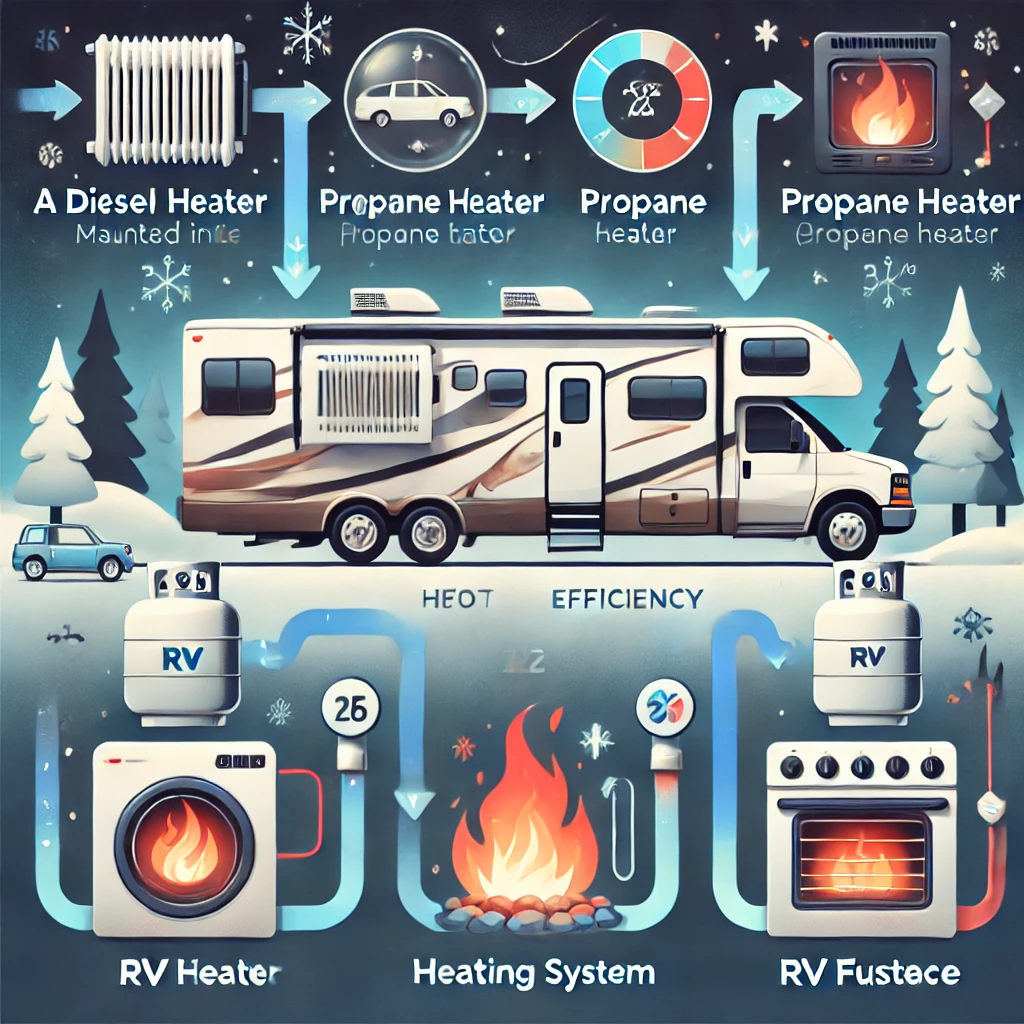
How to Heat Different Types of RV Without Electricity
Heating your RV without electricity is crucial for off-grid camping, emergencies, or cold-weather travel. However, the best heating methods can vary depending on the type of RV. Let’s explore how to efficiently heat motorhomes, travel trailers, camper trailers, and fifth-wheel trailers without electricity.
1. Heating Motorhomes Without Electricity
Motorhomes, with their built-in features, offer several options for staying warm without power.
Best Heating Methods
- Propane Furnace: Most motorhomes come with a propane heating system that can operate without electricity.
- Catalytic Heaters: A flameless, propane-efficient solution for smaller spaces.
- Wood-Burning Stove: Compact stoves can provide consistent heat in Class A, B, or C motorhomes.
Extra Tip: Insulate large windows in Class A motorhomes with thermal curtains to retain heat.
2. Heating Travel Trailers Without Electricity
Travel trailers, known for their versatility, require efficient and compact heating solutions.
Best Heating Methods
- Portable Propane Heaters: Perfect for small to mid-sized trailers due to their efficiency.
- Butane Heaters: Compact and easy to use for short-term heating.
- Thermal Insulation: Add rugs, door draft stoppers, and window coverings to minimize heat loss.
Extra Tip: Place heat-reflecting foil behind seating and walls for added warmth.
3. Heating Camper Trailers Without Electricity
Camper trailers, often smaller, heat up quickly but also lose heat faster.
Best Heating Methods
- Propane Catalytic Heaters: Highly efficient for tight spaces with no open flame.
- Hot Water Bottles: Simple yet effective for personal warmth during the night.
- Thermal Sleeping Bags: Insulated sleeping bags trap body heat, perfect for cold conditions.
Extra Tip: Seal gaps in canvas or pop-up walls to prevent cold drafts.
4. Heating Fifth-Wheel Trailers Without Electricity
Fifth-wheel trailers, with their spacious interiors, require powerful and consistent heating options.
Best Heating Methods
- Built-In Propane Furnace: Many fifth-wheel RVs have built-in propane furnaces for reliable heating.
- Wood-Burning Stove: Perfect for long-term camping and spacious layouts.
- Portable Catalytic Heaters: Safe and fuel-efficient for supplemental heat.
Extra Tip: Use insulated skirting around the fifth wheel to block cold air from beneath the RV.
General Tips for Heating Any RV Without Electricity
- Maximize Insulation: Use thermal curtains, weatherstripping, and rugs to retain heat.
- Ventilation Is Key: Always ensure proper ventilation when using propane or wood-based heating methods.
- Strategic Parking: Park in sunny areas during the day and shield yourself from wind exposure.
- Layer Up: Wear thermal clothing, and use wool blankets or sleeping bags for added warmth.
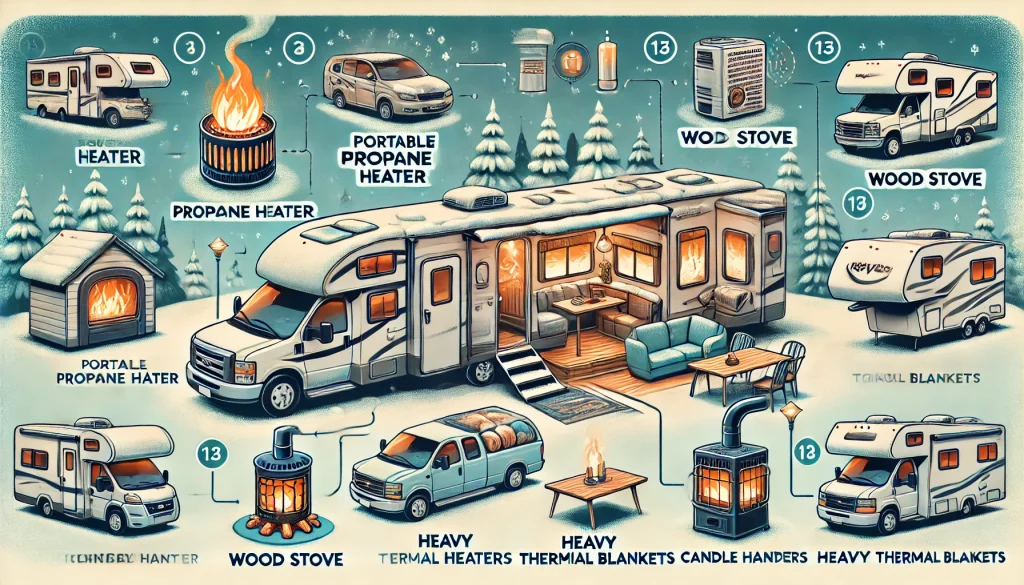
Common Mistakes When Heating an RV Without Electricity and Their Solutions
Heating an RV without electricity can be challenging, and mistakes often lead to safety risks, inefficiency, or discomfort. Below are common errors and practical solutions to ensure safe and effective heating.
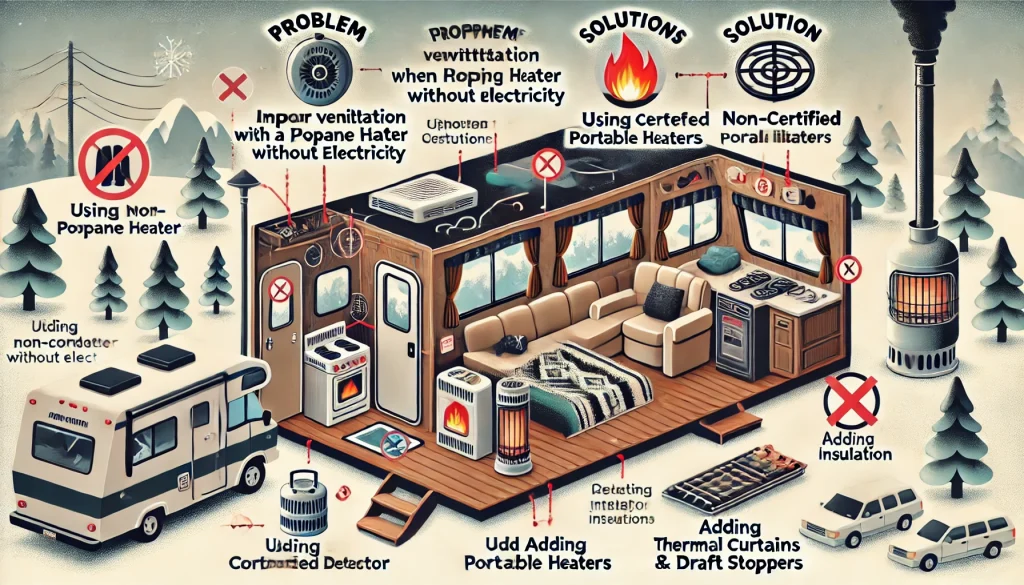
1. Poor Ventilation When Using Propane Heaters
Mistake: Many RV owners forget to ventilate the space while using propane heaters, leading to a buildup of carbon monoxide.
Solution:
- Always crack open a window or roof vent when using propane heaters.
- Install a carbon monoxide detector for early warning.
- Use catalytic heaters, which burn cleaner and reduce CO risks.
2. Neglecting Insulation
Mistake: Relying solely on heating devices without addressing poor insulation causes heat loss and wastes fuel.
Solution:
- Use thermal curtains to cover windows and retain warmth.
- Seal gaps in doors and windows with weatherstripping.
- Add RV skirting around the base to block cold air from underneath.
- Use rugs or foam mats to insulate the floors.
3. Overlooking Safety Precautions
Mistake: Leaving heaters unattended, especially propane or wood-burning devices, increases fire risks.
Solution:
- Never leave portable heaters or wood stoves unattended.
- Use heaters with tip-over protection and auto shut-off features.
- Keep flammable materials (e.g., blankets or curtains) at a safe distance.
4. Using the Wrong Heater for RV Size
Mistake: A heater that is too small won’t warm the RV, while an oversized heater wastes fuel and creates hot spots.
Solution:
- Choose a heater suited for your RV’s square footage.
- Small Trailers/Campers: Portable catalytic or butane heaters.
- Larger RVs/Fifth-Wheels: Built-in propane furnaces or compact wood stoves.
- Check the heater’s BTU rating to ensure it matches your space.
5. Not Maintaining Heating Systems
Mistake: Failing to clean or inspect heating systems leads to inefficiency or breakdowns.
Solution:
- Regularly clean propane furnace vents and replace air filters.
- Inspect propane lines and connections for leaks.
- Service wood stoves and chimneys to prevent soot buildup.
6. Forgetting to Monitor Fuel Levels
Mistake: Running out of propane or wood in cold weather can leave you stranded without heat.
Solution:
- Carry extra propane tanks or wood when traveling.
- Use a propane gauge to monitor fuel levels.
- Plan fuel stops in advance during long trips.
7. Ignoring Heat Loss from the RV Undercarriage
Mistake: Cold air entering from the RV undercarriage reduces interior temperatures.
Solution:
- Use RV skirting to block cold air under the RV.
- Place foam board insulation around tanks and pipes.
- Add rugs or carpets to prevent cold floors.
8. Relying Only on Heaters
Mistake: Using heating devices without considering alternative methods for warmth leads to unnecessary fuel use.
Solution:
- Layer up with thermal clothing and wool blankets.
- Use hot water bottles or heated rice packs for personal warmth.
- Park your RV in a sunny location and avoid windy spots.
More related details will be available on Flamingo Motorhomes.

